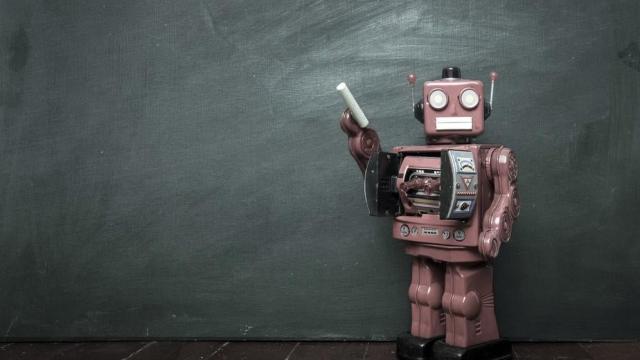ChatGPT writes well enough to fool scientific reviewers, ace AP tests in English and computer science — it even passed the bar exam. The bot sparked a lot of hand-wringing about an upcoming plague of cheating, and many educators are scrambling to get out in front of the problem. ChatGPT is already banned at public schools in New York City, Los Angeles, Seattle, Fairfax County Virginia, and the list is only growing.
But Sam Altman, the CEO of ChatGPT’s maker Open AI, has an answer for school administrators: sorry bro.
“Generative text is something we all need to adapt to,” Altman said in a recent interview, as reported in Insider. “We adapted to calculators and changed what we tested for in maths class, I imagine. This is a more extreme version of that, no doubt, but also the benefits of it are more extreme, as well.”
Altman said he hears educators’ concerns and takes them seriously, and the company will test watermarks on GPT’s responses and other techniques to curb plagiarism. But he warns that approach is probably a lost cause.
“There may be ways we can help teachers be a little more likely to detect output of a GPT-like system. But honestly, a determined person will get around them,” Altman said. “People will figure out how much of the text they have to change. There will be other things that modify the outputted text.”
We’ve already seen that play out in real time. A college student wrote an app that detects whether text was written by GPT, but almost as soon as it was released, people figured out fooling it was as easy as asking the AI to write like a high school student and introduce a few spelling errors. In the long run, generative AI may develop much faster than efforts to suss it out.
Teachers and administrators who want to stop the tech are fighting a losing battle. But there are plenty of thinkers in education who say AI doesn’t have to be an academic apocalypse.
“I think that discussion that should be more prominent is ‘how to use emerging technology’ not whether to ban that technology, because bans will never be effective,” said Akil Bello, senior director of advocacy and advancement at FairTest. “Education and instruction has to change and evolve to integrate that technology and effectively use the technologies that will be a prominent feature of the adult lives of students”
There’s a compelling argument that schools should embrace our new robot overlord, and some teachers are ahead of the curve. Cherie Shields, who teaches high school English in Sandy, Oregon, wrote an op-ed in EducationWeek about how tools like ChatGPT can be a secret weapon in the classroom.
“Teachers should work with its astonishing ability to improve student writing,” Shields said. “AI has the potential to greatly assist students in the essay-writing process. It can help generate ideas, provide feedback on writing style, and even provide templates or outlines.”
Rather than wasting time that could be spent on professional development trying to ban unbanable tech, Shields said schools should design new tests and assessments that harness generative AI as a teaching tool.
“After reading the suggested improvements, students might handwrite another essay, with no computer assistance, and implement some of the language and sentence structure learned from the bot,” Shields said. “Because the bot writes and rewrites so quickly, students can see a number of different ways their writing can improve.”
There’s a more nuanced conversation about schools and technology. Experts like Bello have argued that there’s an over-fixation on testing in our education system, one that often comes at the expense of learning.
That problem garnered a lot attention in the early days of the pandemic, as the shift to remote learning opened up new opportunities for cheating. Many schools rolled out online proctoring tools that were little more than spyware meant to surveil test takers, with immediately negative consequences for students. Some students failed classes because proctoring software flagged them for supposedly “suspicious eye movements.” A sick college sophomore had to vomit into a trash can at her desk during a test, because the stranger watching her through her laptop warned she’d fail if she left the room.
Of course, there’s a need to assess student progress. And in a world where schools are often seen as little more than a way to earn credentials on your way to a job, giving out grades is unavoidable. But changing schools’ approach in response to shifting contexts and technology is the only meaningful solution. Inevitably, that’s probably what’s going to happen anyway.
“The concerns are valid but like most innovations before it banning new technology is at best an ineffective delaying tactic,” Bello said. “When my father started high school slide rules were going to ruin mathematical ability, when I started high school the graphic calculator and computer was boogie man, my sons have PhotoMath on their handheld computers (Samsung cell phones), and their sons will have ChatGPT.”
